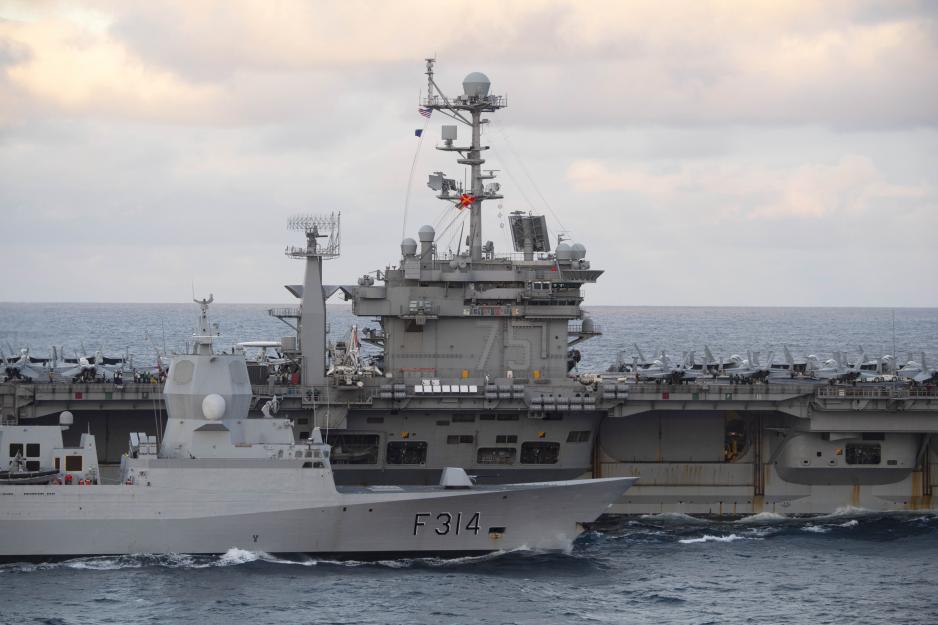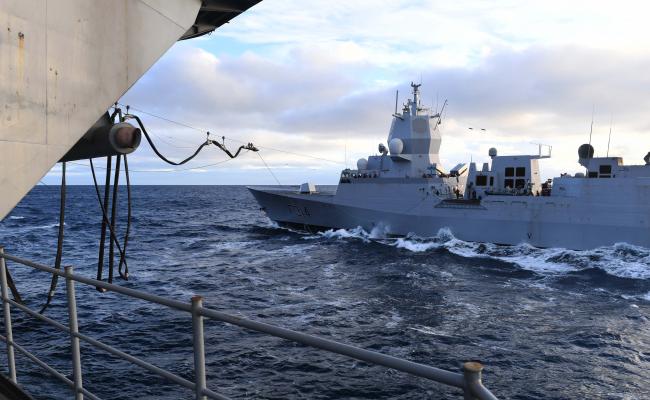High North Whitepaper: “Norway’s National Security Can Only Be Maintained Through Close Cooperation With Our Allies”.

The aircraft carrier USS Harry S. Truman and KNM Thor Heyerdahl during Trident Juncture 2018. (Photo: MCSN Joseph A.D. Phillips/US Navy)
Security politics in the recent Norwegian High North whitepaper leads to increased militarization of the Arctic, according to Lieutenant Colonel Tormod Heier. “Norway’s deterrence and defense capacity is inextricably linked to our NATO membership, in which the USA constitutes the biggest military capacity”, says Hårek Elvenes (Conservatives), MP and member of the Standing Parliamentary Committee on Foreign and Defense Policy.
The latest Norwegian High North whitepaper on was published on 27 November. According to army Lieutenant Colonel and Professor at the Defense University College Tormod Heier, the Norwegian ‘invitation policy’ is continued in the whitepaper, and this contributes to increased militarization of the Arctic. He argues that if Norway were capable of defending its own borders, this would calm Russia.
Hårek Elvenes is a Conservative MP and member of parliament’s Standing Committee on Foreign and Defense Policy. He argues that Norway needs the USA in order to manage security challenges in the High North.
Is it a good idea to continue this ‘invitation policy’ in the High North whitepaper?
“The USA is Norway’s closest ally. The USA is also an Arctic state and has independent interests in the Arctic region. We have seen Russia become increasingly on its toes and rearming its High North. Russia has also demonstrated a will do use military power to achieve political goals against its neighbors. Norway’s national security can only be maintained through close cooperation with our allies, and then primarily through the USA. Ever since WW2, Norway has had security challenges too big to handle alone for us as a nation”, Elvenes says and continues:
“Of course, a solid national defense is important, and the Norwegian defense is currently being built up. However, Norway will not manage to handle all challenges in the High North on its own. It has to be done together with the other NATO members holding a strategic interest in the region, and that applies in particular to the USA and Great Britain.
Should not the advice from professional military researchers like Heier be heeded?
“I find Heier has a one-sided approach to it all. Heier’s analyses are contrary to those of a series of foreign policy and security policy communities. We have seen increased big power rivalry in the Arctic over the past years. Norway is a small country, our geographical position puts us at risk, and we have vast areas in which we are to assert sovereignty and that we have to be able to defend. These are security policy tasks that are so big that we need allied support if the situation so requires.
Do you think there are other strategies Norway could pursue in order to reduce tension in the Arctic, strategies that do not involve military armament or inviting the USA in to the Barents Sea, or is Norway forced to play hardball with Russia?
“Norway’s policy has been based on maintaining the High North as a stable area based on deterrence and reassurance. These have been the two fundamental cores of our foreign policy towards Russia. It has worked since WW2 and there is no need to change it. Norway’s capacity to deter and reassure is inextricably linked to our NATO membership, in which the USA constitutes he largest military capacity”, Elvenes says in closing.
Also read
This article was originally published in Norwegian and ahs been translated by HNN's Elisabeth Bergquist.



